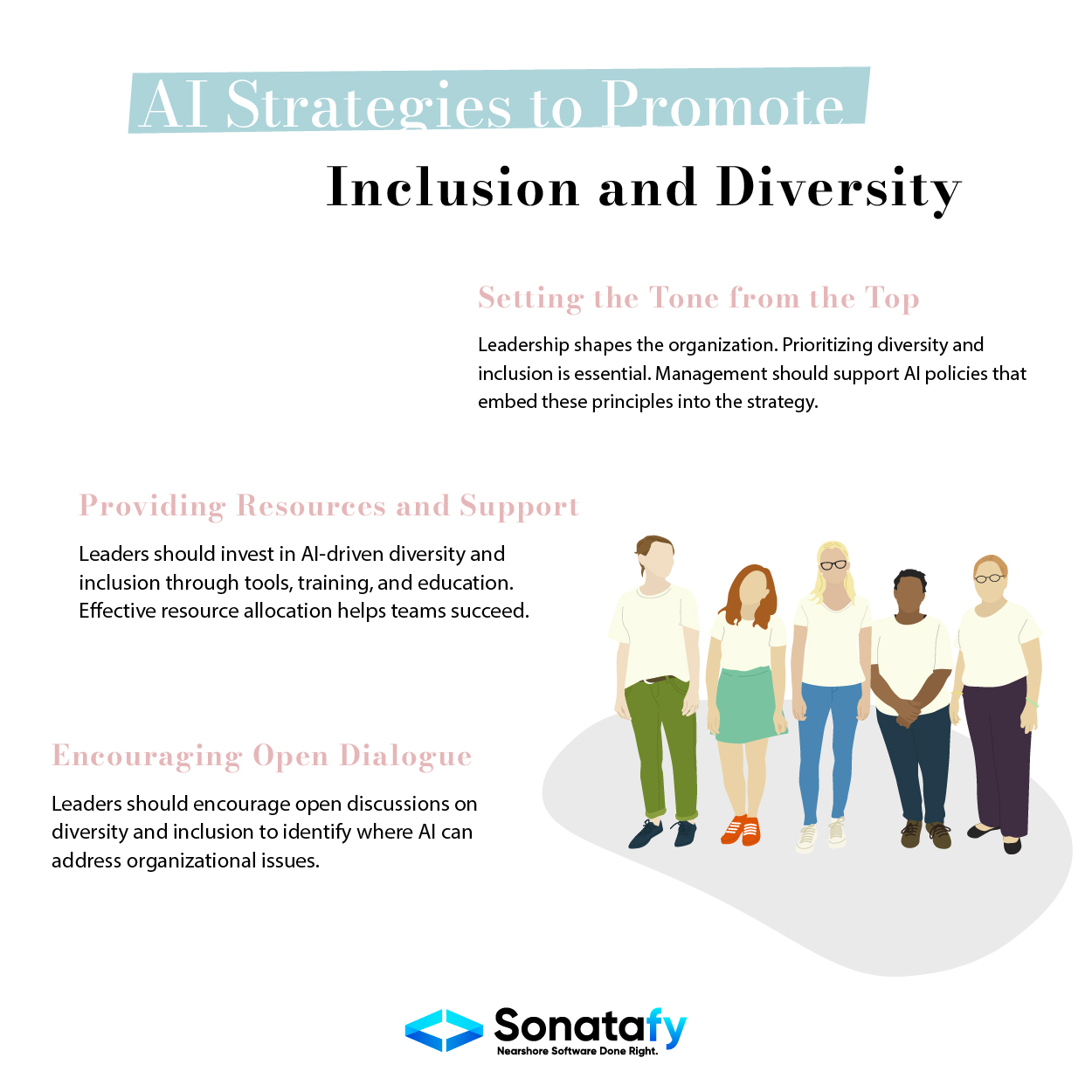Hey readers! I want to talk about how artificial intelligence leads innovation and changes diversity and inclusion in the tech sector. This is crucial, in my opinion, especially in the present day, when society is more accepting of people for who they are.
Artificial intelligence is transforming teamwork and collaboration. In my opinion, AI is essential to increasing the diversity and inclusiveness of our sector. It’s not just about technology; significant cultural changes can impact how we think about what to say.
Diversity and Inclusion in Tech
Diversity and inclusion ensure everyone has an equal chance to succeed and have their voice heard. They bring together teams from different software development industries with other experiences and perspectives.
The Importance of Diverse Teams
I think it takes a diverse group of individuals to generate innovation in a group. When people from different backgrounds collaborate, their unique perspectives can inspire us to develop even more creative ideas. In software development, with continuous problem-solving, this integration can lead to better and more user-friendly products. It is essential to use strengths from different perspectives to create something innovative.
Inclusion: More Than Just Representation
Ensuring everyone feels appreciated and accepted, despite their background, is key to inclusion. I think an inclusive workplace is one where individuals can express themselves freely without fear of reprisal. Such an environment fosters creativity and teamwork.
AI Promoting Diversity and Inclusion
AI technologies and techniques can increase diversity and inclusiveness in the software development industry. This can standardize workplaces and incorporate diversity and inclusion into daily routines.
AI in Hiring and Recruitment
Using AI in recruitment and hiring is one key strategy contributing to diversity and inclusion. Routine hiring can have unconscious biases that interfere with diversity. However, AI can reduce these biases.
AI-powered recruitment tools can scan job descriptions to ensure they don’t have any discriminatory terms that would discourage potential candidates. They can also review resumes without bias, focusing only on the qualifications and skills that are important for the job. I believe this could really shake things up and help us attract a more diverse group of candidates.
Training and Development
AI can play a significant role in training and development. Learning platforms powered by AI can create customized training programs for different teams. These platforms can determine missing skills and offer specific content to help team members grow. In my opinion, everyone gets the chance to move forward in their careers, no matter where they start.
Monitoring and Reporting
AI can also help promote inclusion by observing workplace interactions to spot signs of bias or discrimination. For example, AI can check how meetings go to make sure everyone gets a chance to speak and that no one person is hogging the conversation. These tools can give instant feedback, which can help create a more inclusive atmosphere.
Using AI to Promote Inclusion and Diversity
While AI requires good leadership to be effective, it holds great promise for greater diversity and integration. Leaders in the software development industry have to be proactive about using AI strategies and making sure everyone feels included.

Setting the Tone from the Top
I think leadership really shapes the whole organization. Leaders who place greater priority on diversity and inclusion demonstrate the importance of this principle. Management should support AI policies that encourage diversity and inclusion, ensuring these efforts are integrated into the organization’s overarching strategy.
Providing Resources and Support
Leaders must ensure they invest in AI-driven diversity and inclusion efforts by providing resources like AI tools, training, and education about bias and inclusion. By allocating resources effectively, leaders can help their teams succeed.
Encouraging Open Dialogue
In my opinion, open conversations are crucial to creating an inclusive environment. Leaders should motivate team members to speak up about their experiences and viewpoints on diversity and inclusion. This can help identify areas where AI can tackle specific organizational issues and opportunities.
Benefits and Applications
AI has many advantages over diversity and inclusion. These real cases show the real impact of artificial intelligence.
Improved Team Performance
Inclusive and diverse teams generally work best. When people are hired or promoted, AI can help capture their potential rather than prejudice, increasing creativity, engagement, and productivity.
Better Innovation
Innovation happens when different viewpoints are appreciated. AI helps by including everyone and ensuring every team member feels valued. This leads to better ideas and improved products.
Better Customer Insights
A diverse team can better understand and meet the demands of various customers. Teams can learn more about customer segments and use AI to analyze customer data to create solutions that meet their requirements. This needs to be done to maintain competition in the current global market.
Challenges and Considerations
When it comes to increasing diversity and inclusion, AI has a lot to offer. However, it is essential to understand the issues and focus areas.
Handling Algorithmic Bias
Ensuring that AI algorithms are unbiased is a critical problem to solve. AI systems can support pre-existing biases without being tested and built entirely. Various individuals need to work on making AI technology fair and unbiased.
Ensuring Data Privacy
AI systems need a lot of data to work well. It’s essential to collect that information and use it appropriately. Companies should protect individual privacy and be transparent about using AI to promote inclusion and diversity.
Continuous Improvement
Finally, ensuring everyone is valuable and unique is an ongoing process rather than a one-time thing. You have to keep an eye on it and get better at it. The AI stuff needs to keep getting better to reach its goals. I feel like companies need to stick with it and keep trying to make things better.
Ethical Considerations and Best Practices
Using AI to increase diversity and inclusion is excellent, but we need to consider the ethical issues, and best practices should be implemented.
Transparency and Accountability
Transparency is essential when implementing multitasking and integration using AI. We use AI tools, and the data needed should be obvious. Mechanisms should be put in place to take responsibility for any issues that arise and assure that AI will act fairly and ethically.
Involving Diverse Teams in AI Development
The development of AI programs should involve teams to avoid algorithmic biases. This will ensure that multiple perspectives are considered and that AI programs are designed to be as inclusive as possible. Together, we will significantly reduce the possibility of biased results.
Regularly Updating and Evaluating AI Systems
AI systems shouldn’t stay the same; they must be updated and checked regularly to work well and remain fair. Companies should monitor their AI tools and make changes when necessary. This strategy ensures that AI-driven diversity and integration processes work as intended and are flexible enough to adapt to changing circumstances.
Custom and Integrated AI Solutions
At Sonatafy Technology, we provide our clients with a comprehensive, end-to-end AI Journey, offering completely customized and fully-integrable AI solutions. Our AI resources are designed to help clients dramatically accelerate the integration of AI into their business and gain the advantage of staying ahead in our highly competitive tech landscape. Our expert AI team can help develop strategic and complex AI concepts, ensure data readiness, build the resources, and execute market-ready products. Use our customized AI Journey & Integration Process to significantly increase productivity and expand to new opportunities in tech!
Diversity & Inclusion in the Future of AI
I am very optimistic about AI’s potential to enhance integration and diversity. AI will continue to evolve and provide increasingly powerful tools to promote equity in the workplace. However, we must be careful and always keep the moral side of things in mind.
Conclusion
I think AI has great potential to increase diversity and inclusion in software development. With the right use of AI, organizations can be innovative, inclusive, and vibrant. Effective leadership, transparency in our operations, and continuous improvement are essential. As we move forward, we must acknowledge the potential improvements that artificial intelligence (AI) can bring and focus on ethics. The future of our industry depends mainly on our ability to maintain a work environment in which all individuals can thrive.



